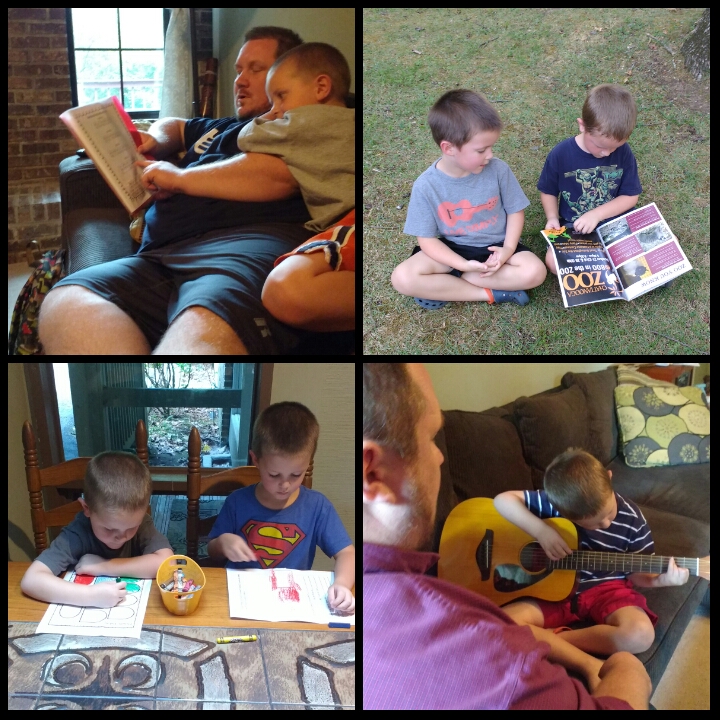
Photo Credit: Sister Kate Photography
I have two boys, and they are four and five years old. With one barely in kindergarten, I’ve been thinking lately about school and how all roads lead to another scarier, more grown up road. For some people, that is military service. For others, it is the workforce, but for many it is some sort of college education. College is my working life’s work – I loved being in college, and I love working at a college. I get to spend my days watching students succeed in both big and small ways, and sometimes if I’m lucky, I get to play a small part in their success. My area of expertise lies firmly in academic preparedness, but because no one is an island, I see students experiencing their first steps of adult life in a variety of ways.
I firmly believe that my 5-year old kindergartener and the average college freshman experience many similar things, and now that I’ve experienced it myself, I can say the same thing for being the parent of a kindergartener and (I’m assuming from my powers of observation), the parent of a recent high school graduate. What I get to see is two ends of the spectrum, and because I can’t compartmentalize anything in life, I have to find common bonds between work and home.
My littles love to learn new things, and they love to brag about what they have learned to anyone at anytime. By college, I tend to see a grumpier attitude about learning, and I know that attitude occurs long before college hits. This leads me to wonder…how can I make sure my kids grow up to be prepared for their next steps? It is a strong goal in my life to raise children who are prepared for their future, whether it is college, military service, or the workforce (I’ll focus more on college because it’s what I know).
Disclaimer: Please, please, please, take these tips as just that — tips. I tell my students all the time and I have to remind myself that anything we read needs to be run through the filter of what we know about ourselves and our own situations. So not everything works for everybody, and not every situation is the same.
Teach your kids to advocate for themselves.
The sooner they learn to fight their own battles, the better off they will be. Trust me, you as a mom can’t call college professors to ask why your daughter did so poorly on a test and expect an answer. If you could, my mom would have done it years ago (love you, Mom). It is not your job to call your child’s boss and give an excuse for his/her absence. Kids, no matter the age, need to learn how to speak intelligently for themselves, which leads me to the next one…
Teach them to be respectful, especially with authority figures.
We all deserve respect, and when we don’t get that respect, we tend to get defensive. Teachers, professors, bosses and parents are not immune to this feeling — so teach respect! Teach your kids how to disagree and argue a point in a way that does not belittle or demean the other party. Hear me clearly: respect doesn’t mean you agree with everyone or that people have a right to treat you poorly. Respect (in this area) means that you can speak to others without blowing up, pitching a fit, or throwing blame on someone else.
Don’t play into the blame game.
Most often, I hear students pointing fingers at someone else when things go south. The professor, tutor, study group, financial aid, etc. is to blame for their problems. Although it is true that often things happen outside of our control, we do have the ability to change our own actions and push ourselves to be and do better. When your children blame someone else, don’t let them off the hook completely — ask questions. Ask them how they can respond or be better next time as well. Sometimes our problems rest solely on our shoulders, and even if that isn’t the case, we are responsible for how we choose to deal with them.
Teach them how to learn and talk to them about the process.
Show them that learning is not something that happens to them, it is something you do and participate in. The value of learning will last them far beyond grade school. Students who appreciate learning will continue to thirst for it on their own. People who look for knowledge will find it. It is not always someone else’s job to teach information when a child can take initiative and learn on his own (this becomes painfully clear in college). Our minds are naturally curious, and that should be celebrated and cultivated, early and often. It’s hard to get that back once the excitement has been turned off. Boy, I could keep going on and on with this, but I’m starting to get preachy here.
Play toward their strengths.
Please do not teach your kids they need to be doctors or lawyers to be happy. If your child does not do well in math, please make sure he gets the help he needs so he can be successful. But if your child continually says how he hates math, don’t be quiet while he talks about wanting to become an engineer. Your children’s future college advisors and professors will thank you!
Practice positive language.
Negative energy is contagious. When your child has schoolwork that you think is silly or useless, please do not immediately address it in front of your child. Show as much excitement and interest as possible when talking directly to your children. Your excitement will be a catalyst to help them push through difficult, often mindless, or tedious work. I cannot name the times I have been able to recall “useless” facts from my school years in an effort to help students, solve a problem, or win a game of trivia. As an adult, we are often responsible for many mindless, pointless tasks, and negative thoughts about those tasks never make the time and energy more fruitful. The sooner we can teach that, the better.

I am fully aware of how easy it is for me to write this advice when my kids are not even close to making the college/workforce/adulthood jump. I do, however, see every day the common bonds between young adults and their younger counterparts. I also know that the years pass faster than we would like, and that every habit we develop, cultivate, and support has an effect on our kids both now and in the future.


















